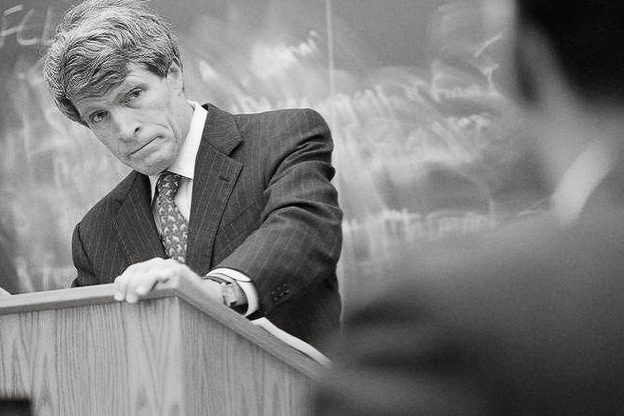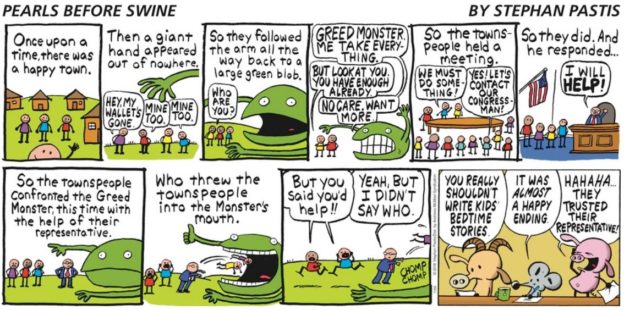
Richard Painter for U.S. Senate
[This is my personal endorsement. I’ve had some good conversations with other people associated with LeftMN about Richard Painter, but I am speaking only for myself.]
Poll after poll tell us that “government” and health care are the top concerns of voters and have been for some time. People don’t like government, don’t trust it, and have low opinions of politicians. This is not uniformly fair, but the attitudes are summed up quite well by Stephan Pastis in his most recent Sunday cartoon Pearls before Swine.

Stephan Pastis: Pearls before Swine
Even Senator Elizabeth Warren says that the system is rigged, and not in favor of ordinary citizens either.
It’s the money, naturally, lots of it and much of it anonymous or at least absurdly difficult to trace. Members of Congress have to dial for dollars every day. The horse-race types in the media measure how well a politician is doing by how much money she or he has raised, often without regard to where it came from. And this is the easy part. 501 (c) (4)’s like the Minnesota Jobs Coalition, the Minnesota Action Network, the gun lobby, including the NRA, and the MCCL are the La Brea Tar Pits of politics where honest politicians go to die.
Professor (because that is what he is: a law professor at the University of Minnesota Law School) Richard Painter has called the NRA a “protection racket” for many years. He’s right. We won’t advance progressive causes – or be able to protect progressive rights we have – until we do something about the dark money. It is just that simple. Policy babble will just be policy babble until we make government more transparent and accountable to ordinary citizens instead of the Koch brothers.
I can’t think of a finer agent for change in the Congress to combat the corrosive influence of money than Richard Painter. He has a national reputation on government ethics and the slips and falls from the path of grace of the Trump administration. I suspect that Richard gets more face time on national television than all the Democratic senators combined. He would, in the words of Professor Mark Osler, in an interview he did for LeftMN:
Ethics, and particularly the rules about conflicts of interest, undergird what trust we have in government. Painter would immediately become a leader in the Senate on the issue of ethics. Congress has a lot of generalists like Tina Smith. The few specialists – like Elizabeth Warren on consumer protection – have great influence. I would want our Senator to have great influence in one of the most important areas emerging. For one thing, modern media seek out experts, and that provides a platform that generalists don’t enjoy.
Richard Painter has half-a-million Twitter followers; Tina Smith’s senate account has under 29,000. Painter’s following is nationwide, to be sure, but isn’t that good when you’re trying to elect an influential politician? One who could stand up on the Senate floor and quote chapter and verse about the Trump administration’s misdeeds? I would.
Richard has a ethics reform plan for what he’d do if elected. He’s clearly knowledgeable on these issues. He is also a vice-chair of CREW – Citizens for Responsibility and Ethics in Washington, currently on leave. He was involved in CREW’s lawsuit against Donald Trump for violation of the Emoluments Clause, announced the day after Trump took office:
The nonpartisan watchdog group Citizens for Responsibility and Ethics in Washington also announced a lawsuit against Trump the day after he took office, again citing payments from foreign governments.
Painter does not accept PAC money or dark money of any kind. He isn’t fêted at fund raisers by executives in the medical devices industry.
Richard Painter has more progressive views on health care and the environment than Tina Smith does. He supports Bernie Sanders’ bill for single-payer health care. Senator Smith, who could sign on to the bill today, says she’s “listening,” although it isn’t clear to whom, since polling reveals single-payer to be popular. Richard is also unalterably opposed to sulfide mining and the colonization of northern Minnesota by foreign billionaires. Senator Smith actively cooperates in selling our clean water patrimony down the Partridge River.
Please read the issues section of Painter’s campaign website; it’s obvious he’s a solid and thoughtful person. And progressive, too.
But DFLers, including people like the party chair, Ken Martin, former representative and current hopeful Ryan Winkler, and activists like Lana Slavitt say, Oh, he used to be a Republican.
That may be true, but I will tell you that I have my doubts about the ability, or even the willingness, of the current crop of Democrats to get the job done, especially on the issues of ethics, corruption, and campaign finance. I have an illustration of that from right here in Minnesota. Readers here will know this story; I have brooded and written about it for five years.
Recall the heady days of the 2012 election. The DFL took control of both houses of the legislature and we defeated the odious efforts to amend the Minnesota Constitution to require a photo ID to vote and to prohibit same-sex marriage. We have the League of Women Voters and the ACLU especially to thank for the voter ID amendment defeat; the DFL party apparatus really gave up on the opposition to it early on, fearing it was a lost cause because these amendments had been uniformly successful elsewhere. It probably would have been if the League and the ACLU hadn’t chipped away at it for a year and a half before the election.
But I digress. What I really want to talk about is what happened – or rather didn’t – after the DFL assumed control of the legislature in 2013. Especially in the wake of the Citizens United decision, many people, including the Campaign Finance and Public Disclosure Board, advocated for the adoption of “electioneering and disclosure” language to shed some light on the tsunami of money that was coming as a result of the holding in Citizens United. Bills were offered in both houses. The House version language was in H.F. 1944, sec. 4.
If you read the first link in the preceding paragraph, you’ll see that this very important language was struck by a conference committee that the DFL controlled. There were just a handful of people who attended the conference committee hearing (in addition to the conferees), including Gary Goldsmith, the long-time executive director of the Campaign Finance Board, Rachel Stassen Berger, a Strib reporter at the time, and me.
Shortly before the committee convened, a staffer brought a box of “committee reports” in on a dolly, still warm from the copier, which told me it was a done deal, however it came out. The committee assembled quickly, Chair Senator Katie Sieben gaveled it in; the committee report was adopted, and it adjourned in all of ten minutes. Probably not that long. We were scruffling through the report, and Gary Goldsmith said, “It’s out.” The disappointment in his voice was keen.
I need to mention as an aside here that Gary Goldsmith is probably the finest public servant I have ever known.
I have refrained from naming names on this DFL fiasco, but I will now. Erin Murphy was the Majority Leader of the House in 2013 and 2014. Ryan Winkler, who has been extravagant in his remarks condemning Richard Painter, was an author of the H.F. 1944 and was on the conference committee; he voted for the conference report. He went gentle into that good night.
Clearly, this was a backroom deal.
Similar language never made it out of committee onto the floor of either house in 2014. We also know what happened in the 2014 election: the DFL lost control of the House, thanks in part to the flood of unaccountable money from the Minnesota Jobs Coalition and the Minnesota Action Network. Ben Golnik, the guy who started the Minnesota Jobs Coalition, was named executive director of the House after the election.
Kurt Daudt was also on the conference committee; he seemed to be licking his chops at the time. I don’t know why. Really, of course, I do.
Addendum 8/3: The fiasco involving H.F. 1944 took place, naturally, at the end of the session in 2013. End-of-session negotiations involve the leadership of the two houses of the legislature and the governor’s office. Tina Smith was Governor Dayton’s chief of staff at the time. Gun rights groups and the MCCL were always figured as the parties who were instrumental in the failure of the legislation. I encourage you, boys and girls, to think on that one for a while when you consider Sen. Smith’s pro-choice bona fides. [end of Addendum]
You are all free to do what you want. It is (still) a free country. But I am voting for Richard Painter. I hope you will, too.
Addendum: Here’s a video interview that Professor David Schultz did with Richard Painter. Highly recommended.
Thanks for your feedback. If we like what you have to say, it may appear in a future post of reader reactions.


